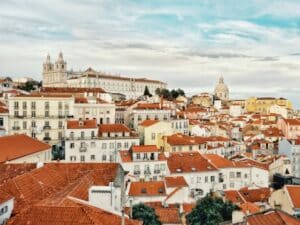If there was an option to retire in Malta vs. Portugal, the decision would not be easy, as both countries are great options for retirees. Malta offers a Mediterranean lifestyle with a warm climate, an English-speaking population, and attractive tax benefits. On the other hand, Portugal provides a low cost of living, breathtaking coastlines, and an excellent healthcare system, which makes it a popular choice for those looking for an affordable yet high-quality retirement.
This article will break down everything you need to know about retiring in Malta vs. Portugal, from retirement programs and benefits to the cost of living, healthcare, and more.
This is what we will cover:
- Who can retire in Malta or Portugal?
- Benefits of Retiring in Portugal
- Benefits of Retiring in Malta
- How to retire in Portugal
- How to retire in Malta
- Healthcare in Malta vs Portugal
- Cost of living in Malta vs Portugal
- Taxes in Malta
- Taxes in Portugal
- Where is it easier to buy property, Portugal or Malta?
- Best places to retire in Malta
- Best places to retire in Portugal
Who can retire in Malta or Portugal?
- EU/EEA citizens can retire freely in both countries.
- Non-EU citizens can retire if they have a stable income and can support themselves.
Benefits of Retiring in Malta
- English is an official language, making daily life and legal matters easy for expats.
- Malta Retirement Programme (MRP) offers tax advantages such as a 15% flat tax rate on foreign pension income.
- No wealth tax, inheritance tax, or estate duty, making it tax-friendly for retirees.
- Over 300 days of sunshine per year, with mild winters and hot summers.
- High-quality healthcare system that is ranked among the best in Europe.
- Public and private healthcare options, with English-speaking doctors.
Benefits of Retiring in Portugal
- Affordable cost of living, with a couple living comfortably on €2,000 to €2,500 per month.
- No wealth tax, inheritance tax, or estate duty
- Mild winters and warm summers, perfect for outdoor living.
- Stunning landscapes, including beaches, mountains, and historic cities.
- High-quality universal healthcare system (SNS), with affordable medical services.
- Public healthcare access for residents, with private healthcare options also available.
How to Retire in Portugal
Portugal offers a few visas that allow foreign nationals to retire in the country, depending on their needs and goals, such as the D7 Visa for retirees with passive income or the Golden Visa for those interested in investment opportunities.
The Portugal D7 Visa, or Retirement Visa, is a residency permit that allows retirees to live in Portugal if they have a passive income of at least €870 per month. This income can come from pensions, rental properties, dividends, real estate, or financial investments. The visa grants long-term residency, access to Portugal’s healthcare system, and the possibility of permanent residency or citizenship after five years.
The Portugal Golden Visa is a residency by-investment program that allows non-EU nationals to live in Portugal by making a minimum investment of €250,000 in the country. The program was designed to attract foreign investment and has become one of Europe’s most popular residency programs. Golden Visa holders can live, work, and study in Portugal with minimal stay requirements, of just seven days per year, while also enjoying visa-free travel across the Schengen Zone.
How to Retire in Malta
Malta also has several visa options for retirees, including a retirement program, permanent residency by investment scheme, and a citizenship by investment route. These options provide flexibility depending on whether you’re looking for long-term residency or citizenship.
The Malta Retirement Programme (MRP) is for retirees from non-EU, EEA, and non-Swiss countries who want to live in Malta and enjoy tax benefits. To qualify, applicants must own or rent a home in Malta or Gozo, meet minimum property values, and prove they have a stable income and health insurance. They must live in Malta for at least 90 days per year but spend no more than 183 days in other countries. While local employment is not allowed, some non-executive roles are permitted. The program offers a flat 15% tax rate on pensions and foreign income, with a minimum annual tax of €7,500 plus €500 per dependent.
The Malta Citizenship by Exceptional Services (CES) program also known as the Malta Citizenship by Investment, offers Maltese citizenship to investors who can make a direct investment of at least €600,000 or €750,000 for a faster process, buy a property worth €700,000 or rent for €16,000 per year for five years, and donate €10,000 to charity. This is a great option for retirees interested in European citizenship, visa-free travel, a warm climate, and excellent healthcare while making a secure investment.
The Malta Permanent Residence Program (MPRP) also known as the Malta residency by investment program, allows non-EU citizens to gain permanent residency in Malta through investment and contributions. Investors can rent a property for at least €14,000, make €60,000 government contribution and a €2,000 donation. Another option is to buy a property worth €375,000, make a €30,000 government contribution and a €2,000 donation
Successful applicants and their families can live indefinitely in Malta, enjoy visa-free travel within the Schengen Area, and benefit from a stable, secure EU lifestyle. There is no minimum stay requirement, so the MPRP is ideal for people who want long-term residency in Europe without the need to relocate.
Healthcare in Malta vs Portugal
Malta offers both public and private healthcare. The public system is funded through taxes, and residents can access free or low-cost care, including doctor visits, hospital services, and emergency care. The public healthcare system is of good quality, and English is widely spoken. Retirees can also opt for private healthcare, which is faster and more personalized but comes at a higher cost.
Portugal’s healthcare system is a mix of public Serviço Nacional de Saúde (SNS) and private options. The public healthcare system is largely funded by taxes, and residents can access services at low cost or for free. It covers general medical care, hospital services, and emergency treatments. Many retirees choose private health insurance for faster access to treatment and higher-quality services, which is also affordable compared to other European countries. English is commonly spoken in healthcare facilities in major cities.
Malta vs Portugal healthcare comparison
Here is an overview of both countries’ health care systems.
Aspect | Malta | Portugal |
Healthcare System Type | Public (government-funded) & Private | Public (SNS - Serviço Nacional de Saúde) & Private |
Access to Public Healthcare | Free or low-cost for Maltese citizens & permanent residents | Free or low-cost for residents enrolled in SNS |
Eligibility for Expats | Expats need private insurance unless they become permanent residents | Expats can access SNS with residency & may need private insurance for faster service |
Quality of Healthcare | High-quality, English-speaking doctors, well-developed hospitals | High-quality, but public system can have long wait times |
Private Healthcare | Widely available, faster service, costs vary | Private hospitals & clinics offer shorter wait times, affordable compared to the U.S. |
Health Insurance Costs | €400–€1,500 per year for private insurance | €300–€1,200 per year for private insurance |
Pharmacy & Medications | Widely available, some medications subsidized by the government | Pharmacies are common, some medications covered by SNS |
Emergency Services | Free for residents; well-equipped hospitals | Free through SNS; high-quality emergency care |
Cost of living in Malta vs Portugal
Below is an overview of the living expenses in Malta vs Portugal, including the average monthly budget.
Expense Category | Malta (€) | Portugal (€) |
Monthly Rent (1-bedroom apartment, city center) | €900 – €1,500 | €600 – €1,200 |
Monthly Rent (1-bedroom apartment, outside city center) | €700 – €1,200 | €400 – €900 |
Buying Property (per m², city center) | €4,000 – €6,000 | €3,000 – €5,500 |
Buying Property (per m², outside city center) | €2,500 – €4,000 | €1,500 – €3,500 |
Utilities (Electricity, water, heating, cooling, per month) | €80 – €150 | €70 – €130 |
Internet & Mobile Plan | €30 – €50 | €25 – €45 |
Groceries (monthly for 1 person) | €250 – €400 | €200 – €350 |
Dining Out (mid-range restaurant, per meal) | €20 – €40 | €15 – €30 |
Public Transport (monthly pass) | €26 – €40 | €30 – €50 |
Fuel (per liter) | €1.40 – €1.70 | €1.50 – €1.90 |
Healthcare (private insurance, yearly) | €400 – €1,500 | €300 – €1,200 |
Entertainment & Leisure (gym, cinema, etc.) | €50 – €120 | €40 – €100 |
Overall Monthly Budget (for a comfortable retirement) | €2,000 – €3,500 | €1,500 – €2,800 |
Taxes in Malta
The tax system in Malta is based on residence and domicile. This means that individuals are taxed on their worldwide income if they are residents and domiciled in Malta. However, if they are non-domiciled residents, only their foreign income remitted in Malta is subject to tax.
Tax Type | Details |
Income Tax on Foreign Pensions | Foreign pension income is taxable in Malta if remitted to a Maltese bank account. Rates range from 0% to 35%, but retirees can benefit from lower rates through special tax programs. |
Malta Retirement Programme (MRP) | Retirees from the EU, EEA, and Switzerland can qualify for a 15% flat tax on foreign income remitted to Malta, with a minimum tax of €7,500 per year (+€500 per dependent). |
Tax on Local Income | Any income earned in Malta (such as rental income) is taxed at progressive rates from 0% to 35%. |
Capital Gains Tax | No capital gains tax on the sale of foreign assets (e.g., stocks, property outside Malta) if the gains are not remitted to Malta. |
Wealth Tax | No wealth tax in Malta. |
Inheritance Tax | No inheritance tax, but stamp duty (5%) applies when inheriting Maltese real estate. |
Property Tax | No annual property tax, but stamp duty (5%) applies when buying property. |
VAT (Value Added Tax) | 18% standard rate, applies to goods and services. |
Taxes in Portugal
Taxes in Portugal depend on residence and domicile. Residents pay tax on worldwide income, while non-residents only pay tax on income earned in Portugal. Non-residents are taxed on income from work done in Portugal or paid by a Portuguese company. Residents who are not domiciled in Portugal only pay tax on foreign income if they bring it into the country. If they keep it abroad, it is not taxed in Portugal.
Tax Type | Details |
Income Tax on Foreign Pensions | Foreign pension income is taxable in Malta if remitted to a Maltese bank account. Rates range from 0% to 35%, but retirees can benefit from lower rates through special tax programs. |
Tax on Local Income | Domestic income (like rental income or earnings from work) is taxed progressively from 14.5% to 48% based on the amount. |
Capital Gains Tax | Capital gains on the sale of foreign assets (such as stocks or property) are only taxed if the gains are remitted to Portugal. Capital gains on Portuguese property are taxed at 28%. |
Wealth Tax | Portugal does not have a wealth tax, but there is a Property Tax (IMI) on real estate, which is typically between 0.3% and 0.8% depending on the property’s value and location. |
Inheritance Tax | There is no inheritance tax on transfers to direct descendants or spouses. However, stamp duty (10%) applies to inheritance for other beneficiaries. |
Property Tax | Annual Property Tax (IMI) applies to real estate, ranging from 0.3% to 0.8%. |
VAT (Value Added Tax) | 23% standard VAT rate, with reduced rates of 13% and 6% for certain goods and services. |
Where is it easier to buy property, Portugal or Malta?
The property buying process in Portugal fairly easy. Foreign retirees can purchase property without restrictions. A Portuguese bank account and a NIF (tax identification number) are required. Buyers pay a Property Transfer Tax (IMT), Stamp Duty, and Notary Fees. The process can take a few months.
On the other hand, Malta requires foreign retirees to obtain an Acquisition of Immovable Property (AIP) permit unless buying in a Special Designated Area (SDA). A 10% deposit is required upon signing the Preliminary Agreement. Taxes include Stamp Duty (5%) and Notary Fees. The process can take a few months, but SDA purchases are simpler.
Factor | Portugal Malta | Malta |
Ease of Purchase | No restrictions for foreigners | AIP permit required (except in SDAs) |
Deposit | 10%-20% of property value | 10% upon Preliminary Agreement |
Taxes & Fees | IMT (up to 8%), Stamp Duty (0.8%) | Stamp Duty (5%), Notary Fees |
Property Prices | More affordable, diverse options | Higher prices, limited options |
Process Time | A few months | A few months (faster in SDAs) |
Bank Requirement | Requires a Portuguese bank account | Not mandatory but recommended |
Six Best Places to Retire in Malta

2. Sliema is a popular area with a large expat community. Sliema offers beautiful coastal views, shopping, and a lively atmosphere. It’s great for retirees who want a more urban setting with plenty of restaurants, cafes, and services, all within walking distance.
3. St. Julian’s is known for its lively nightlife and coastal feel. St. Julian’s is suitable for retirees who enjoy a blend of both relaxation and entertainment. The area has many luxury hotels, restaurants, and beach clubs.
4. Mellieha is perfect if you prefer a quieter life with close proximity to nature and the beach. It is located on the northern side of Malta and provides a peaceful environment with stunning beaches and hiking trails.
5. Gozo is the more rural, tranquil island and a top choice for retirees who want peace and natural beauty. It has fewer crowds, stunning countryside views, and charming villages. Life there is more community-focused and slow paced.
Five Best Places to Retire in Portugal

2. Porto is known for its stunning riverside views and famous wine. It has a charming, historical vibe with a more laid-back atmosphere than Lisbon. The cost of living is also lower here, which strikes a balance between beauty and affordable living.
3. Algarve is a sunny region and a retirement favorite, known for its mild climate, beautiful beaches, and relaxed lifestyle. Towns like Albufeira, Lagos, and Faro have a large expat community, and plenty of recreational activities.
4. Madeira is an island off the coast of Portugal. Retirees can expect a mild climate year-round, lush landscapes, and a slower pace of life. The cost of living is lower than in mainland Portugal, so it’s perfect for people who enjoy being in nature.
5. Cascais is near Lisbon, but it’s a charming coastal town known for its high-end living, beautiful beaches, and loved for its proximity to the capital. It’s perfect for retirees who enjoy a refined lifestyle with access to all the amenities of Lisbon, yet want a quieter, more relaxed environment.
As part of our commitment to providing transparent and reliable services, we are proud to be a licensed agent in Malta, holding the official license number AKM-AGEN. This certification demonstrates our dedication to the highest standards in the investment migration industry and further enhances our ability to offer expert guidance and support to our clients.
How Can Global Citizen Solutions Help You?
Global Citizen Solutions is a boutique migration consultancy firm with years of experience delivering bespoke residence and citizenship by investment solutions for international families. With offices worldwide and an experienced, hands-on team, we have helped hundreds of clients worldwide acquire citizenship, residence visas, or homes while diversifying their portfolios with robust investments.
We guide you from start to finish, taking you beyond your citizenship or residency by investment application.

Frequently Asked Questions about Retire in Malta vs Portugal
Which country has a lower cost of living, Malta or Portugal?
Portugal generally has a lower cost of living, including housing, groceries, and healthcare. Malta is smaller and more expensive, especially for rent and imported goods.
Which country has better healthcare for retirees?
Both offer quality healthcare. Malta’s system is more English-friendly, while Portugal’s public system is cheaper but may have longer wait times. Private healthcare is more affordable in Portugal.
Do I need to know the local language to retire in Malta or Portugal?
In Malta, English is an official language, so communication is easy. In Portugal, while many speak English in major cities, learning some Portuguese can help with daily life.
What residency options are available for retirees in Malta?
Retirees in Malta can apply for the Malta Retirement Program (MRP), which offers special tax benefits, or the Malta Permanent Residence Program (MPRP), which grants long-term residency through investment. Another option is the Malta Citizenship by Naturalization for Exceptional Services (CES), which leads to citizenship through investment.
What residency options are available for retirees in Portugal?
Retirees in Portugal can apply for the D7 Visa, which is ideal for those with passive income like pensions. Another option is the Portugal Golden Visa, which requires a minimum investment of €250,000. Both visas offer a pathway to permanent residency and citizenship after five years.
Which country has a better climate for retirement?
Both have mild winters and hot summers, but Malta is smaller, more humid, and has fewer green spaces, while Portugal offers more climate variety across its regions.


